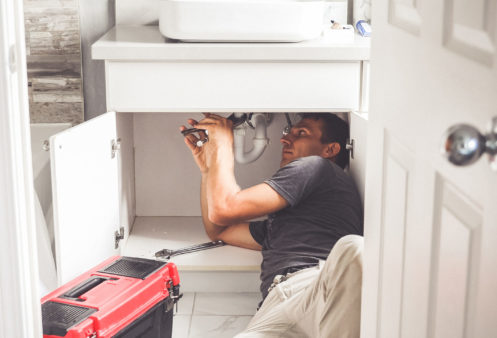Knowing which chemicals can go down the drain and which ones shouldn’t is essential for protecting your home’s plumbing from damage as well as protecting the environment. That’s why it’s important that you make sure you know how to properly dispose of any chemicals you have around your home. In this article, we’ll provide a full overview of the types of chemicals that can and shouldn’t go down your drains or the trash so that you can avoid plumbing issues and do your part to protect the environment.
How to Know Which Chemicals Can Go Down the Drain
Certain types of chemicals have the potential to cause serious harm to your drains and sewer since they can eat through pipes and lead to leaks eventually developing. This even includes most types of chemical drain cleaning products. Despite the manufacturers of these products claiming they’re safe to use and won’t damage your plumbing, they definitely can cause damage since the chemicals they contain are so incredibly corrosive.
Most drain cleaners contain either extremely strong acids or bases. Pouring drain cleaner or any other type of acid down a sink, shower or toilet increases the chances of the drain pipe leaking since the acid is corrosive enough that it can weaken or eat straight through the pipe. Crystal drain cleaners that contain alkaline or basic chemicals can be even worse since these chemicals react with water to produce an extreme amount of heat, which can lead to warping or deformation that may cause pipes to come loose. These issues are why the best option when dealing with a clog is always to use a plunger or pipe snake.
Generally speaking, there aren’t really that many chemicals that should ever go down the drain other than certain types of cleaning products. Even pouring bleach down the drain regularly can lead to major plumbing issues arising in the future. If you do have a bottle of old bleach you need to dispose of, it’s important that you use a large amount of water to flush it down the sink so that it quickly exits your plumbing and doesn’t cause any damage.
You can also dispose of some acidic chemicals without much risk to your plumbing if it’s your only option. However, you need to make sure that you first fully dilute the acid before pouring it down the drain. The best method in this situation is to add a half cup of the acid to a 5-gallon bucket of water and then flush this down the drain with plenty of water. If you don’t dilute the acid first, there’s an extremely high chance it will cause serious damage to your pipes and sewer line, leading to your house requiring a major plumbing repair.
There are also a variety of chemicals that won’t damage your plumbing but still shouldn’t go down the drain due to the potential environmental impact they can have. This includes things like paints, varnishes, stains, carpet cleaner, metal cleaner, furniture and floor polish, oven cleaner and any other solvent-based cleaner or polish. The issue is that these chemicals can contaminate drinking water and any nearby bodies of water, which is why you should also never pour them on the ground or down a storm drain. If you have any old medications and pharmaceuticals, the local police station will usually accept them so they can be properly disposed of. The reason that no type of pharmaceutical should be flushed down the toilet is that they’ll end up in rivers and lakes and can seriously harm plant and animal life.
Which Types of Chemicals Can and Can’t Go in the Trash?
If you’re unsure whether any chemical product can go down the drain or into the trash, the product label will usually provide information on the proper method of disposal. If the label doesn’t say anything about how to dispose of the product, you can usually assume it is safe to throw it in the trash.
Generally speaking, any of the chemicals and products we listed above that have the potential to damage the environment should always be taken to the local hazardous waste disposal station. If you throw them away, they’ll just end up in the landfill where the chemicals can still end up leaching into the soil and contaminating the groundwater.
Pesticides, herbicides, solvents and oil-based paints are among the many things that are generally illegal to throw away and must be disposed of at a hazardous waste station. Some places allow you to throw latex-based paint into the trash as long as you take the lid off and let it fully dry out before putting it in the trash. However, this isn’t true for all locations so it’s important to check the rules in your area. Most municipal waste management agencies will also have a designated area for disposing of old gasoline and used motor oil since neither one should go to the landfill.
How to Properly Dispose of Cooking Oil and Grease
In terms of potential plumbing damage, it isn’t just chemicals you need to worry about. Pouring cooking oil and grease down the kitchen sink can be equally as harmful to your drain and sewer system since it creates a huge potential for clogs to develop. Oil and grease are also extremely bad for the municipal sewer system since they often lead to sewer mains getting clogged with massive “fatbergs” made up of solidified grease and fats along with solid materials like wet wipes, feminine hygiene products and whatever else people flush down their toilets.
The primary issue with cooking oil and grease is that they are hydrophobic, which means they don’t mix with water. The result is that the oil and grease end up floating on top of the water and often clinging to the inside of drain pipes and sewer lines instead of getting washed away. Over time, this leads to a sticky build-up on the insides of the pipes that starts to capture food scraps, toilet paper and any other solid items, forming a blockage that starts to clog the pipe. If you frequently pour fat, oil and grease down your drains, the fat layer inside your pipes can get so thick that it greatly reduces the diameter of the pipes so that they drain far more slowly. This also further increases the chances of your pipes frequently clogging and you needing to hire a plumber to unclog your plumbing.
These issues are why you should make sure to always dispose of grease and oil by pouring it into a sealable container and then putting it into the trash. If you have a large amount of cooking oil, say from a turkey fryer, you can also pour it into a bag of cat litter or some other absorbent material. Making sure to wipe fat, oil and grease off your plates, pots and pans before washing or rinsing them is also an easy step that can greatly help in avoiding plumbing problems that require drain cleaning.
When you’re dealing with any plumbing, heating or air conditioning issues in the Newburgh area, Polar Plumbing, Heating & Air Conditioning is the company to turn to for help. We specialize in plumbing and HVAC repairs and have what it takes to ensure your issues are fixed quickly and correctly. You can also count on us for professional inspections, maintenance and installations. To schedule a service call, contact our expert team today.

